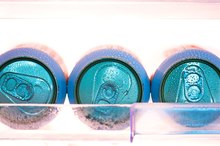Indigestion & Shortness of Breath While Eating
Indigestion and shortness of breath while eating may be signs of various conditions. Make an appointment with your doctor to discuss your symptoms and treatment options. A clinical diagnosis should be made before you attempt to self-treat your symptoms. The most common reasons for indigestion and shortness of breath while eating include an isolated instance of indigestion, heartburn, gastroesophageal reflux disease, also called GERD, and a food allergy. Some conditions may cause life-threatening symptoms that will require emergency attention. Call your doctor if you symptoms continue or get worse.
Indigestion
Indigestion is the feeling of fullness in your stomach and chest or discomfort in your upper-chest while you’re eating. Chronic indigestion may be a sign of a more serious condition, such as gallbladder disease or peptic ulcer, according to Cleveland Clinic. Common symptoms that are typical with indigestion include gas, nausea, vomiting, acidic taste, heartburn, abdominal pain, bloating and diarrhea. Eating certain foods, such as highly acidic foods and spicy foods, may cause indigestion. Other causes of indigestion include stress, over-eating, eating too fast and eating high-fat foods.
- Indigestion is the feeling of fullness in your stomach and chest or discomfort in your upper-chest while you’re eating.
- Other causes of indigestion include stress, over-eating, eating too fast and eating high-fat foods.
Heartburn
Symptoms of GERD in Women
Learn More
Heartburn will cause a burning sensation in your chest or back of your throat that is caused by a back-up of stomach acid. Heartburn is a common condition that occurs seldom in most people. If you have heartburn consistently, you should talk with your doctor for further testing. Heartburn may make you feel like you’re short of breath because of the pain associated with severe heartburn. Chronic heartburn is commonly caused by a weak esophageal sphincter muscle that fails to keep the stomach acid away from your throat.
- Heartburn will cause a burning sensation in your chest or back of your throat that is caused by a back-up of stomach acid.
GERD
GERD is a chronic condition that causes constant heartburn from a backflow of bile, stomach chemicals and acids that cause irritation and harm to the lining of your esophagus. Most symptoms are related to heartburn and acid reflux, and are primarily managed through the use of over-the-counter medications and lifestyle changes. In extreme cases, you may need surgery or prescribed medication to treat your symptoms. If you develop common symptoms of GERD along with shortness of breath, jaw and arm pain, you need to seek medical attention. These symptoms may be a sign of a heart attack.
- GERD is a chronic condition that causes constant heartburn from a backflow of bile, stomach chemicals and acids that cause irritation and harm to the lining of your esophagus.
- In extreme cases, you may need surgery or prescribed medication to treat your symptoms.
Food Allergy Consideration
Pain in the Left Shoulder After Eating
Learn More
If you have a food allergy, you may develop the symptoms of indigestion along with shortness of breathe, wheezing, trouble breathing, chest pain, diarrhea, vomiting, hives, skin rashes, nasal congestion and lightheadedness, according to PubMed Health.
Related Articles
References
- Indigestion symptoms and treatments. Nhsinform.scot. https://www.nhsinform.scot/illnesses-and-conditions/stomach-liver-and-gastrointestinal-tract/indigestion.
- National Institute of Diabetes and Digestive and Kidney Diseases. Definition & facts for GER & GERD. Nov 2014.
- National Institute of Diabetes and Digestive and Kidney Diseases. Indigestion (dyspepsia). Updated November 2016.
- National Institute of Diabetes and Digestive and Kidney Diseases. Acid reflux (GER & GERD) in adults. Updated November 2015.
- Indigestion symptoms and treatments. Nhsinform.scot.
Writer Bio
Diane Marks started her writing career in 2010 and has been in health care administration for more than 30 years. She holds a registered nurse license from Citizens General Hospital School of Nursing, a Bachelor of Arts in health care education from California University of Pennsylvania and a Master of Science in health administration from the University of Pittsburgh.









